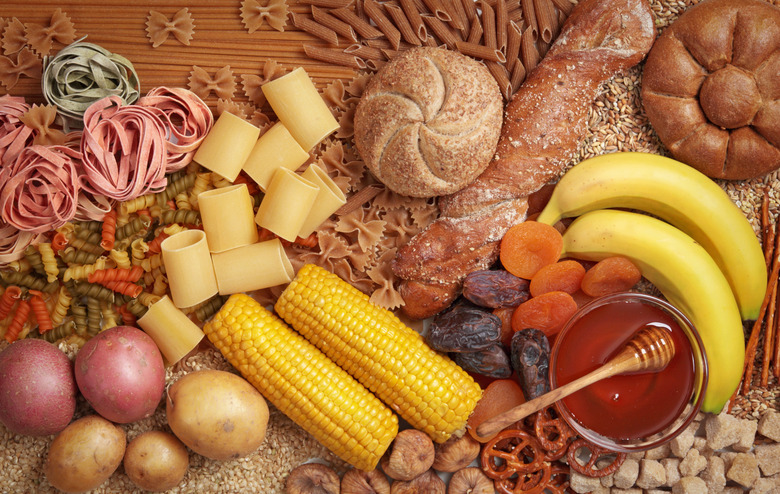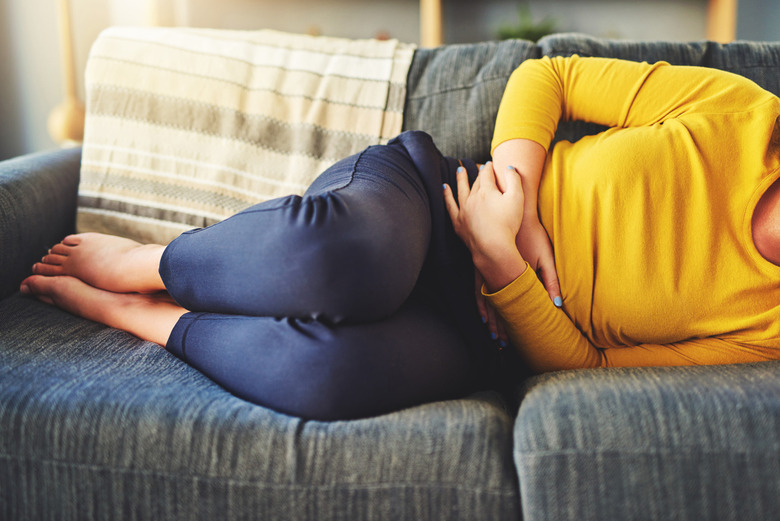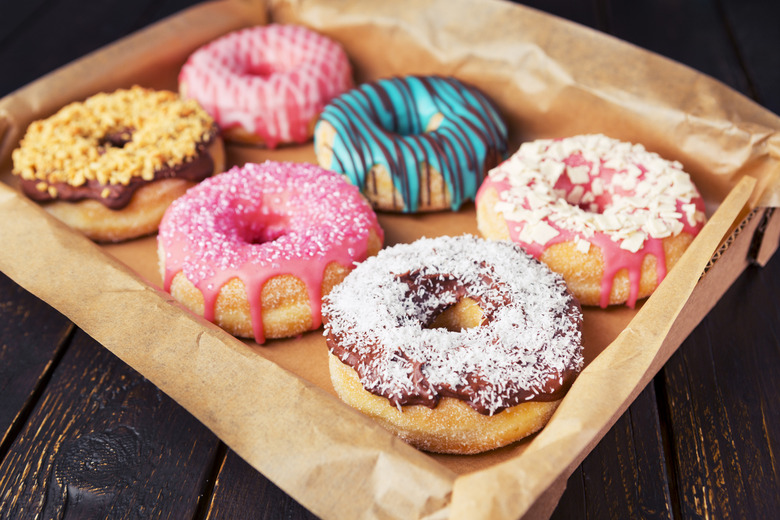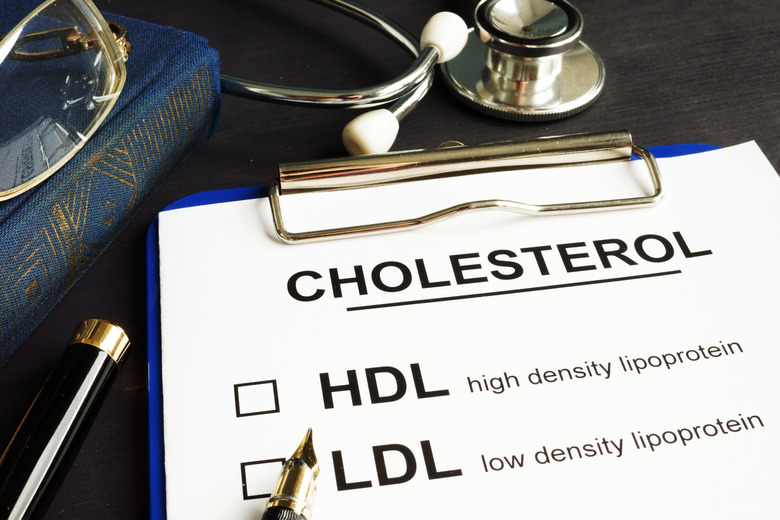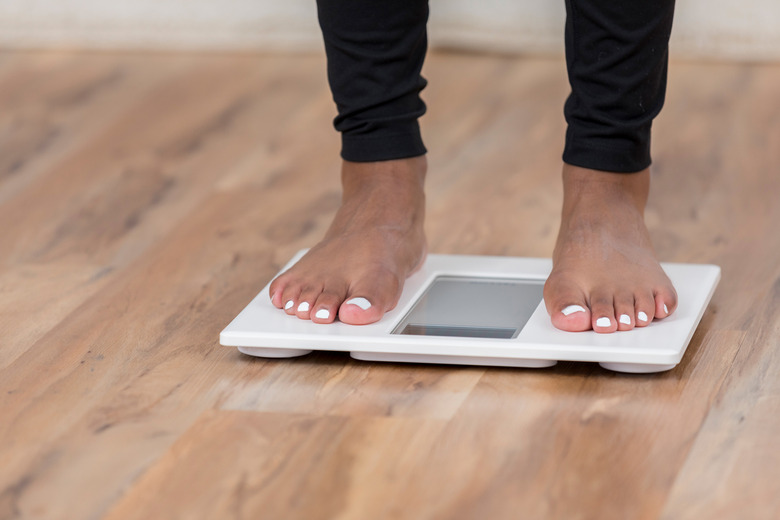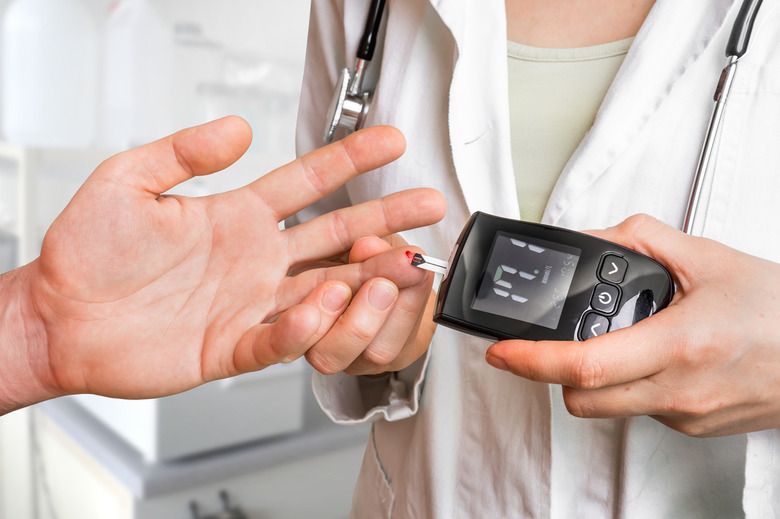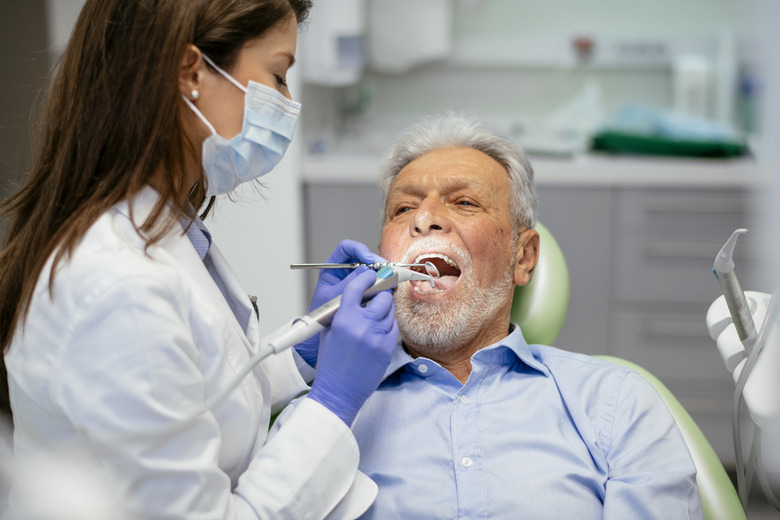Signs You're Eating Too Many Carbs
Carbohydrates, or carbs, are made up of sugars, starches and fibers. They are commonly found in white bread, pasta, whole grains and processed foods. Some people would separate carbs into "good" or "bad," but all carbs are necessary for the body because they are converted into energy. When you're working out, carbs give you the energy to keep moving. However, overconsuming them may lead to negative effects on the body. We checked in with the American Heart Association, The National Center for Biotechnology Information and Harvard Medical School to explore the symptoms you may experience if you go overboard on carbs.
Feeling sluggish or fatigued
If you've ever eaten food and then felt like taking a nap right after, it could be because of your carbohydrate intake. Eating too many carbs elevates your blood sugar, causing your body to have short bursts of energy and eventually leading to a "crash" or feeling of exhaustion and tiredness. If you're worried about your sleeping habits, familiarize yourself with the amount of sleep doctors recommend every night.
Always feeling thirsty
Do you sometimes feel thirsty even after chugging a whole bottle of water? That isn't always one of the signs you're not drinking enough water. It could be because of your diet. If you ate a high-carb meal, your blood sugar level elevates, making you feel more thirsty and causing more frequent urination. The water helps rehydrate your bloodstream and removes the excess sugar through your urine.
Headaches
Headaches and migraines are among the health symptoms you should never ignore. In fact, they can be a sign that your body is being thrown off by excessive carbohydrate intake. Eating foods that are high in carbs, like white bread or pasta, can spike your sugar levels, which sometimes cause headaches.
Poor digestion
If you've had difficulty using the bathroom or fewer than three bowel movements in a week, carbs may be causing issues for your digestive tract. You may feel bloated after eating due to certain foods having trouble breaking down in your intestines. If you're eating a lot of refined carbohydrates like white rice, they may not contain enough dietary fiber to help prevent digestion issues such as constipation. Instead of carb-heavy foods like bread and potatoes, try sauerkraut, tempeh and other foods that are great for your gut health.
Mood swings
Carbs aren't just one of the surprising reasons you always feel tired. For some people, diet affects mood. You could be happy and feel energetic after eating a pint of ice cream given all carbohydrates turn into sugar, giving the body energy for a short period of time. However, a few hours after eating, you may experience an emotional crash from the sugar rush, leading you to feel cranky.
Sugar cravings
One of the surpising reasons you always crave sugar is that, well, you're eating sugar. Eating cookies, chocolates, doughnuts and cupcakes actually make you crave more than just that one treat. Dopamine, also known as the happy hormone, gets released into your body as you consume sugar. This chemical triggers your brain and body to react to this action as a reward and seeks more.
Feeling hungry again
Foods that are rich in protein and healthy fats take longer to digest and help you feel full for a longer period of time. But if your diet consists of mostly carbohydrates and lacks in fats or protein, you might feel unsatisfied after eating or feel the need to snack afterward. Most refined carbs, such as white bread, have their nutrients and fibers stripped away, turning them into empty calories. These foods metabolize faster into glucose and promote a faster digestion process, which doesn't allow your body to feel full. Keeping satiated is just one of the reasons you need to eat more fat.
High cholesterol
Fatty meats like beef or pork are known to raise cholesterol, but carbohydrates don't help either. The American Journal of Clinical Nutrition has linked having a high-carb diet with lower levels of high-density lipoprotein (HDL), or good cholesterol, and high levels of low-density lipoprotein (LDL), or bad cholesterol, which may lead to increased risk of heart disease and diabetes.
Trouble losing weight
If you're realizing no matter how much you exercise, the weight just won't come off, then you may need to look deeper into your diet. Carb-rich diets can make you feel hungry and lead you to eat more calories than you really need. This is because foods with low fiber content metabolizes into glucose faster and the sudden spike in blood sugar levels promotes the production of insulin. When insulin absorbs too much glucose, it is converted into fat and stored in your body.
High blood sugar
If your doctors tell you that you have high blood sugar, bad carbs may have something to do with it. Processed foods, like white bread, enter into your bloodstream faster than whole grains, which creates an imbalanced glucose and insulin level.
Acne breakouts
Have you noticed your skin breaking out after eating chocolate or something sugary? There have been studies that have linked carbohydrates to aggravated acne development. This happens because an increase in insulin levels stimulates oil gland production, which causes breakouts. Eat chia seeds, broccoli and more foods for healthy, glowing skin.
Depression
Many factors can cause depression, like insomnia, but your diet can also have a major impact. A study published by The National Center for Biotechnology Information showed that eating too much sugar and other carbohydrates can trigger an imbalance in certain brain chemicals, which can increase a person's chance of experiencing depression and anxiety. When your body is put through a rollercoaster of high blood sugar levels, it will eventually crash — and that includes your mood — potentially leading to long-term effects. Carbs aren't entirely bad for you, and fiber, in particular, is an important part of a healthy diet.
Abdominal pain
That bowl of pasta may have tasted amazing, but do you feel bloated or gassy after eating it? There is a chance that you may experience abdominal issues with a carb-rich diet for different reasons. Pasta contains gluten, so if you're someone who can't properly digest gluten or have an intolerance, it's easy for you to feel bloated or have some abdominal irritation. Instead of beans and other carb-heavy foods, try eating avocado, fennel, Greek yogurt and other foods that fight bloat.
Increase in cavities
Sugar falls under the category of carbohydrates and scientists have seen the overconsumption of sugar, excluding natural sugars from fresh fruit, not only increase the risk of heart disease but also dental problems. Starchy foods made from white flour can linger in your mouth and break down into simple sugars. Bacteria then feeds on the sugar and produces an acid that causes tooth decay. So not only can you suffer from cavities, you can experience toothaches, sensitivity to hot and cold and pain while chewing.
Forgetfulness
Do you sometimes forget to turn the light off before leaving a room or leave your keys in your car? You might be experiencing some brain fog from eating too many carbs. When you overindulge in sugars or grains, your brain becomes overwhelmed by the high levels of insulin released in your body. This decrease certain functions in your brain, leading to some impairment in your memory and thinking. This is just one of the surprising signs you're eating too much sugar.
More from The Daily Meal:
Foods You'd Never Guess Are Loaded With Salt
50 Foods That Lower Your Risk of Cancer
